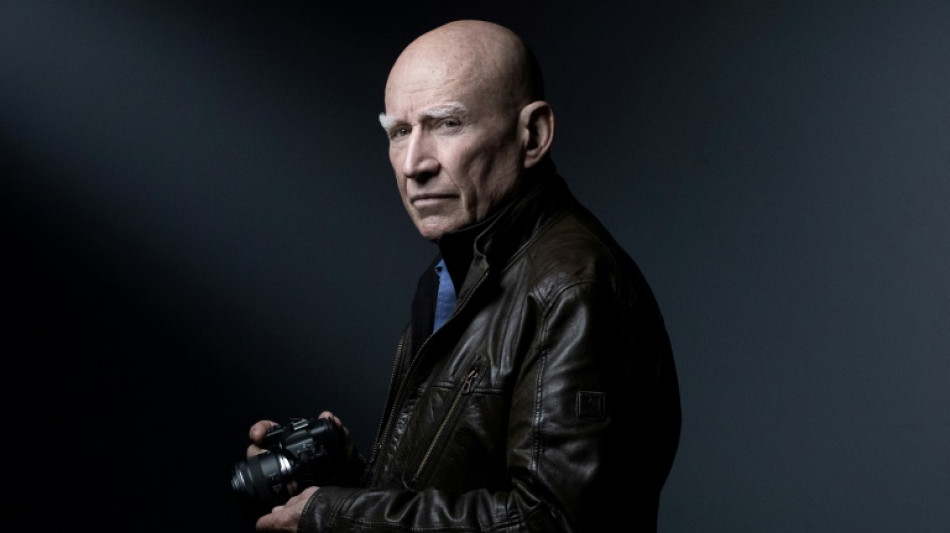
-
 US Supreme Court appears skeptical of Trump tariff legality
US Supreme Court appears skeptical of Trump tariff legality
-
AC Milan post third straight annual profit on day of San Siro purchase
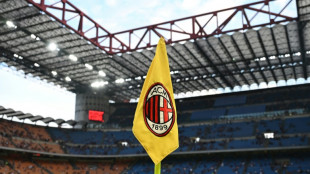
-
 Angelina Jolie visits Ukrainian frontline city, media reports say
Angelina Jolie visits Ukrainian frontline city, media reports say
-
UN says forests should form key plank of COP30
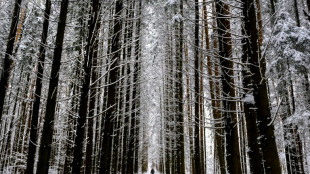
-
 Star designer Rousteing quits fashion group Balmain
Star designer Rousteing quits fashion group Balmain
-
Mexico's Sheinbaum steps up cartel fight after murder of anti-narco mayor
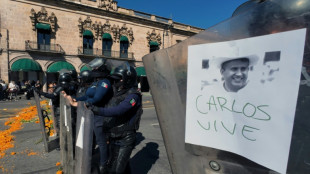
-
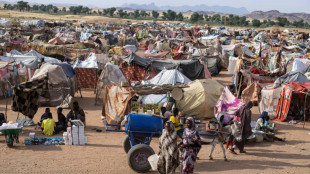 Attack on funeral in Sudan's Kordofan region kills 40: UN
Attack on funeral in Sudan's Kordofan region kills 40: UN
-
Key PSG trio set for spell on sidelines
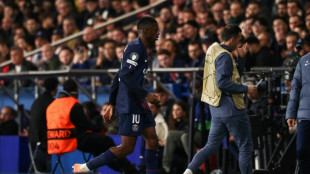
-
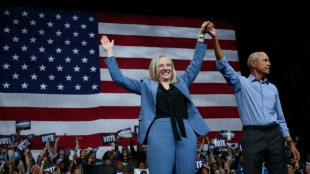 Democrats punch back in US elections - and see hope for 2026
Democrats punch back in US elections - and see hope for 2026
-
BMW reports rising profitability, shares jump

-
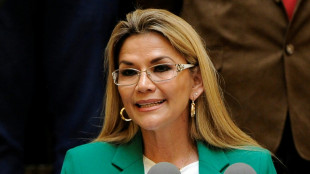 Bolivia Supreme Court orders release of jailed ex-president Jeanine Anez
Bolivia Supreme Court orders release of jailed ex-president Jeanine Anez
-
Wall Street stocks rise after positive jobs data
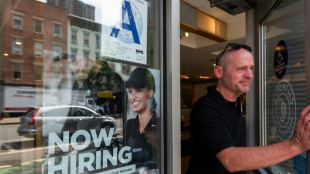
-
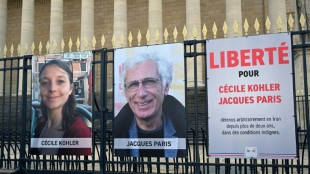 'Hostage diplomacy': longstanding Iran tactic presenting dilemma for West
'Hostage diplomacy': longstanding Iran tactic presenting dilemma for West
-
Rybakina stays perfect at WTA Finals with win over alternate Alexandrova

-
 Le Garrec welcomes Dupont help in training for Springboks showdown
Le Garrec welcomes Dupont help in training for Springboks showdown
-
Brussels wants high-speed rail linking EU capitals by 2040
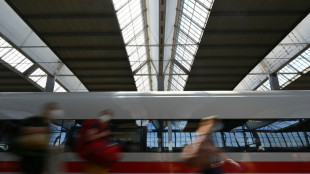
-
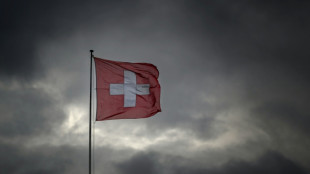 Swiss business chiefs met Trump on tariffs: Bern
Swiss business chiefs met Trump on tariffs: Bern
-
Spain's exiled king recounts history, scandals in wistful memoir

-
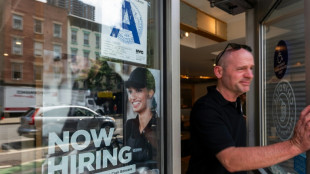 Wall Street stocks steady after positive jobs data
Wall Street stocks steady after positive jobs data
-
Trump blasts Democrats as government shutdown becomes longest ever
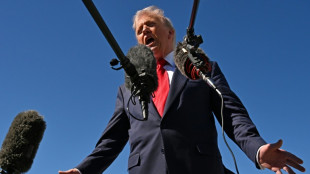
-
 Indian pilgrims find 'warm welcome' in Pakistan despite tensions
Indian pilgrims find 'warm welcome' in Pakistan despite tensions
-
Inter and AC Milan complete purchase of San Siro

-
 Swedish authorities inspect worksite conditions at steel startup Stegra
Swedish authorities inspect worksite conditions at steel startup Stegra
-
Keys withdraws from WTA Finals with illness

-
 Prince Harry says proud to be British despite new life in US
Prince Harry says proud to be British despite new life in US
-
EU strikes last-ditch deal on climate targets as COP30 looms

-
 Stocks retreat as tech bubble fears grow
Stocks retreat as tech bubble fears grow
-
Shein opens first permanent store amid heavy police presence

-
 West Indies edge New Zealand despite Santner brilliance
West Indies edge New Zealand despite Santner brilliance
-
French pair released by Iran await return home

-
 German factory orders up but outlook still muted
German factory orders up but outlook still muted
-
Death toll tops 100 as Philippines digs out after typhoon

-
 Attack on key city in Sudan's Kordofan region kills 40: UN
Attack on key city in Sudan's Kordofan region kills 40: UN
-
'No one could stop it': Sudanese describe mass rapes while fleeing El-Fasher

-
 Champagne and cheers across New York as Mamdani soars to victory
Champagne and cheers across New York as Mamdani soars to victory
-
Medieval tower collapse adds to Italy's workplace toll

-
 BMW boosts profitability despite China, tariff woes
BMW boosts profitability despite China, tariff woes
-
South Africa's Wiese wary of 'hurt' France before re-match

-
 Beyond limits: Croatian freediver's breathtaking record
Beyond limits: Croatian freediver's breathtaking record
-
Tottenham supporting Udogie after alleged gun threat in London

-
 Thunder roll Clippers to stay unbeaten as SGA keeps streak alive
Thunder roll Clippers to stay unbeaten as SGA keeps streak alive
-
In appeal, Australian mushroom murderer alleges 'miscarriage of justice'

-
 Toyota hikes profit forecasts 'despite US tariffs'
Toyota hikes profit forecasts 'despite US tariffs'
-
Ex-France lock Willemse challenges Meafou to become 'the bully'

-
 Ukrainians to honour sporting dead by building country they 'died for': minister
Ukrainians to honour sporting dead by building country they 'died for': minister
-
At least 7 dead after UPS cargo plane crashes near Louisville airport

-
 US Supreme Court hears challenge to Trump tariff powers
US Supreme Court hears challenge to Trump tariff powers
-
US government shutdown becomes longest in history

-
 India's Modi readies bellwether poll in poorest state
India's Modi readies bellwether poll in poorest state
-
Green goals versus growth needs: India's climate scorecard


Sebastiao Salgado, photojournalism elevated to art
Brazilian photojournalist Sebastiao Salgado, who died Friday, spent five decades chronicling the best and worst of planet Earth, from far-flung natural wonders to horrifying human catastrophes.
The self-taught photographer crisscrossed the globe throughout his life, from Rwanda to Guatemala, from Indonesia to Bangladesh, documenting famine, war, exodus, exploitation and other tragedies of the so-called Third World with the empathy of "someone who comes from the same part of the world," as he said.
His elegant black-and-white universe also celebrated the planet's immense beauty, such as the "flying rivers" of the Amazon rainforest, and served as a warning of nature's fragility in the face of climate change.
He leaves an iconic body of work, published in "Life," "Time" and other leading magazines, collected in a stunning series of books, and regularly exhibited in the museums of world capitals such as Paris, where he lived for much of his life.
Salgado won a long list of prestigious prizes across his career, including the Prince of Asturias and Hasselblad awards, and was the protagonist of filmmaker Wim Wenders' Oscar-nominated documentary "The Salt of the Earth" (2014), about the photographer's sojourns in distant corners such as the Arctic Circle and Papua New Guinea.
- From Africa to Reagan -
Born on February 8, 1944 in the rural county of Aimores in southeastern Brazil, Salgado grew up with seven sisters on their father's cattle farm.
He recalled it as a place where visiting friends and family meant traveling for days, which he said taught him the patience to wait for the magical "fraction of a second" of the perfect photograph.
He earned a master's degree in economics from the University of Sao Paulo, where he was active in the left-wing student movements of the turbulent 1960s. In 1969, he and his wife, Lelia Wanick, fled to France to escape Brazil's military dictatorship. He went on to receive French citizenship.
He picked up Wanick's camera by chance one day in 1970 and was instantly hooked.
"I realized snapshots brought me more pleasure than economic reports," he said.
His job with the International Coffee Organization took him frequently to Africa, where he started taking pictures on the side. He would go on to turn down a dream job at the World Bank in Washington to pursue photography full-time.
Wanick, who staunchly backed his career, stayed home raising their two sons, Juliano Ribeiro and Rodrigo, who was born with Down syndrome.
Salgado's photos of drought and famine in countries such as Niger and Ethiopia landed him a job at renowned photo agency Magnum in 1979.
He was working there when he captured one of the biggest news stories of the time, the assassination attempt on US president Ronald Reagan in 1981.
Salgado made front pages worldwide with his photos of the shooting -- 76 frames in 60 seconds.
But his true rise to fame came with his first book, "Other Americas" (1984) -- a series of portraits taken throughout Latin America -- and his unforgettable photographs of misery and resistance among the hordes of mud-covered miners at Brazil's infamous Serra Pelada, the biggest open-air gold mine in the world.
Critics accused him of "beautifying suffering," but Salgado never veered from his aesthetic or his work.
- Lens on Bolsonaro -
Painstaking and meticulous, he liked to take his time getting to know his subjects, his three Leica cameras hanging from his neck.
Photography "is a way of life," he told AFP in 2022, on a trip to Sao Paulo to present his exhibition "Amazonia," the product of seven years shooting the world's biggest rainforest.
"It's connected with my ideology... my human and political activity. It all goes together."
A dedicated climate activist, he was a fierce critic of Brazilian President Jair Bolsonaro (2019-2022) for the far-right leader's push to open the Amazon to agribusiness and mining.
Salgado also founded an environmental organization called Instituto Terra to revive disappearing forests in his home state, Minas Gerais, a successful project joined by more than 3,000 landowners.
T.Ziegler--VB



